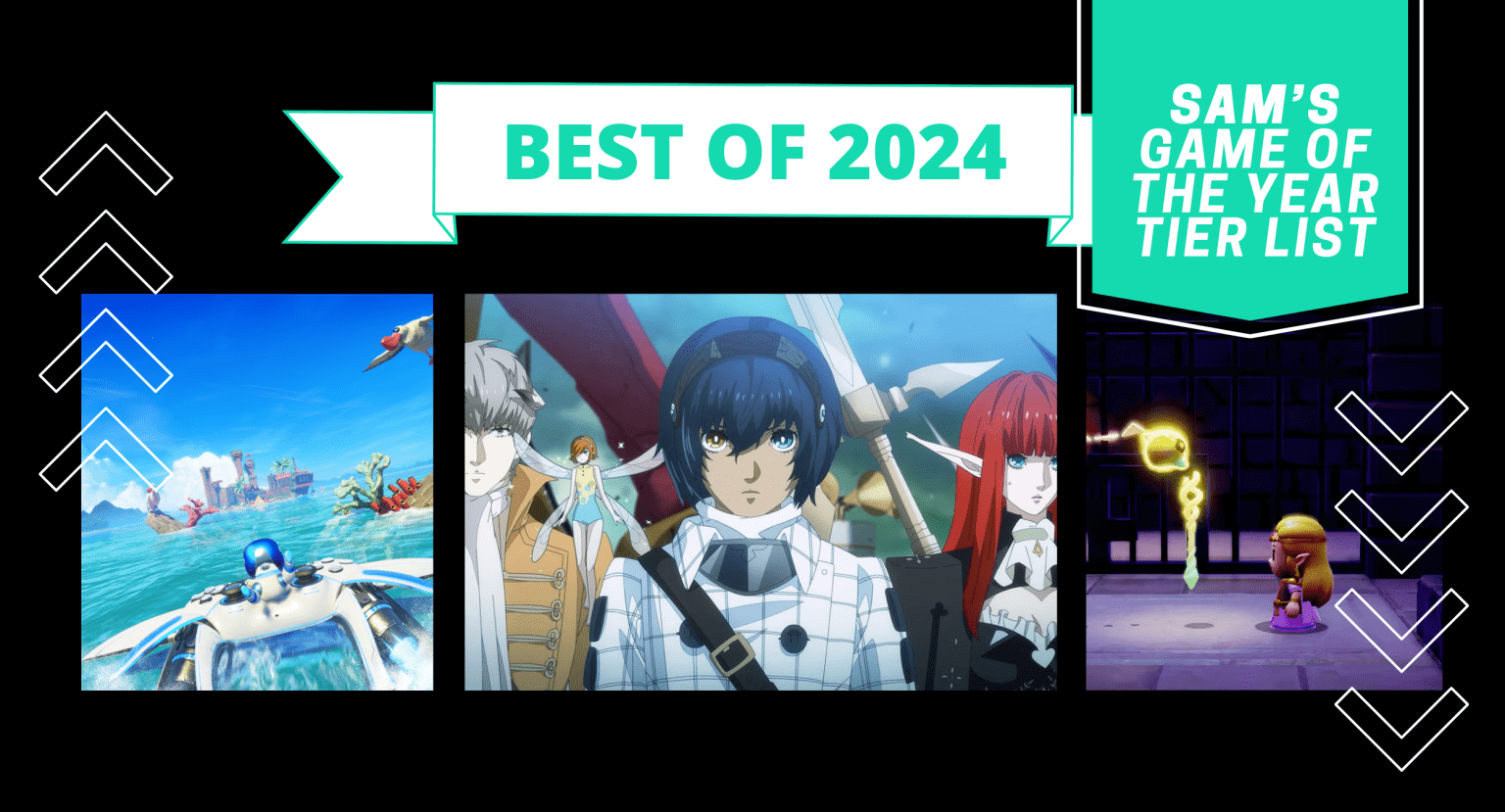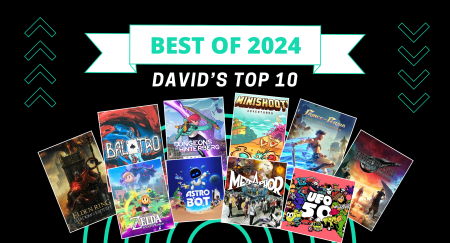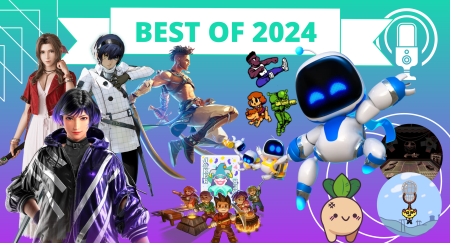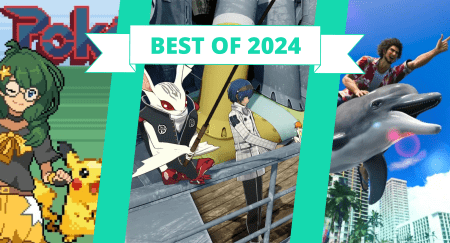Once More ‘Round the Sun
I’ve had a long year. There’s no need to get into the details of why—either I’ve written about it already or don’t care to write about it—but I’m glad 2025 is almost here, if for no other reason than to reach an arbitrary endpoint from which to rise from the ashes.
In a lot of cases, the new games of 2024 helped me through some of the tougher moments. Other times, they didn’t. Regardless, I always enjoy celebrating (or not celebrating) a year’s worth of new digital experiences, at least as a way to remind myself of how this year went for me.
I wouldn’t say this was a particularly notable gaming year for me personally—which is not to say it was bad or disappointing—but I struggled more to make this tier list than I have in previous years. For the most part, I enjoyed the games I played this year, even if only a handful really stuck with me. Even the worst titles of 2024 weren’t that bad, though (most of) the best of the best probably wouldn’t be as high on previous years’ lists.
Day’s end, I enjoyed the games of 2024, even if I wouldn’t say this was an especially great year. There was plenty of variety, both in terms of genre and ambition, and there weren’t many major flops (well, just one for me). I’m sure plenty will disagree on my read of 2024, but to me it pales in comparison to last year, at least in terms of the higher end. Still, I had a lot of fun, and that’s the point of all this, right?

The Rules
With all that in mind, please enjoy my 2024 Game of the Year Tier list. After all that’s happened this past year, let’s remember to have some fun. Here are the parameters:
- Every game I played this year, including notable remakes/remasters (but not ports), will be placed on a list according to several quality tiers.
- Each tier will list games in alphabetical order, and the best game in each tier will receive special honors (save for the lowest two tiers and the penultimate tier).
- The lowest tier (Anti-Game of the Year) and highest tier (Game of the Year) will obviously each contain only one game.
(For transparency, here are some notable 2024 games I have not played, as of writing: Like a Dragon: Infinite Wealth, Tekken 8, Elden Ring: Shadow of the Erdtree, Black Myth: Wukong, Stellar Blade, Dragon Age: The Veilguard, Thank Goodness You’re Here, Rise of the Ronin, Dragon Quest III HD-2D Remake, Dragon’s Dogma 2, Unicorn Overlord, UFO 50, The Plucky Squire, Mario & Luigi: Brothership, Neva, and many others.)

Anti-Game of the Year
The worst game I played this year, period.
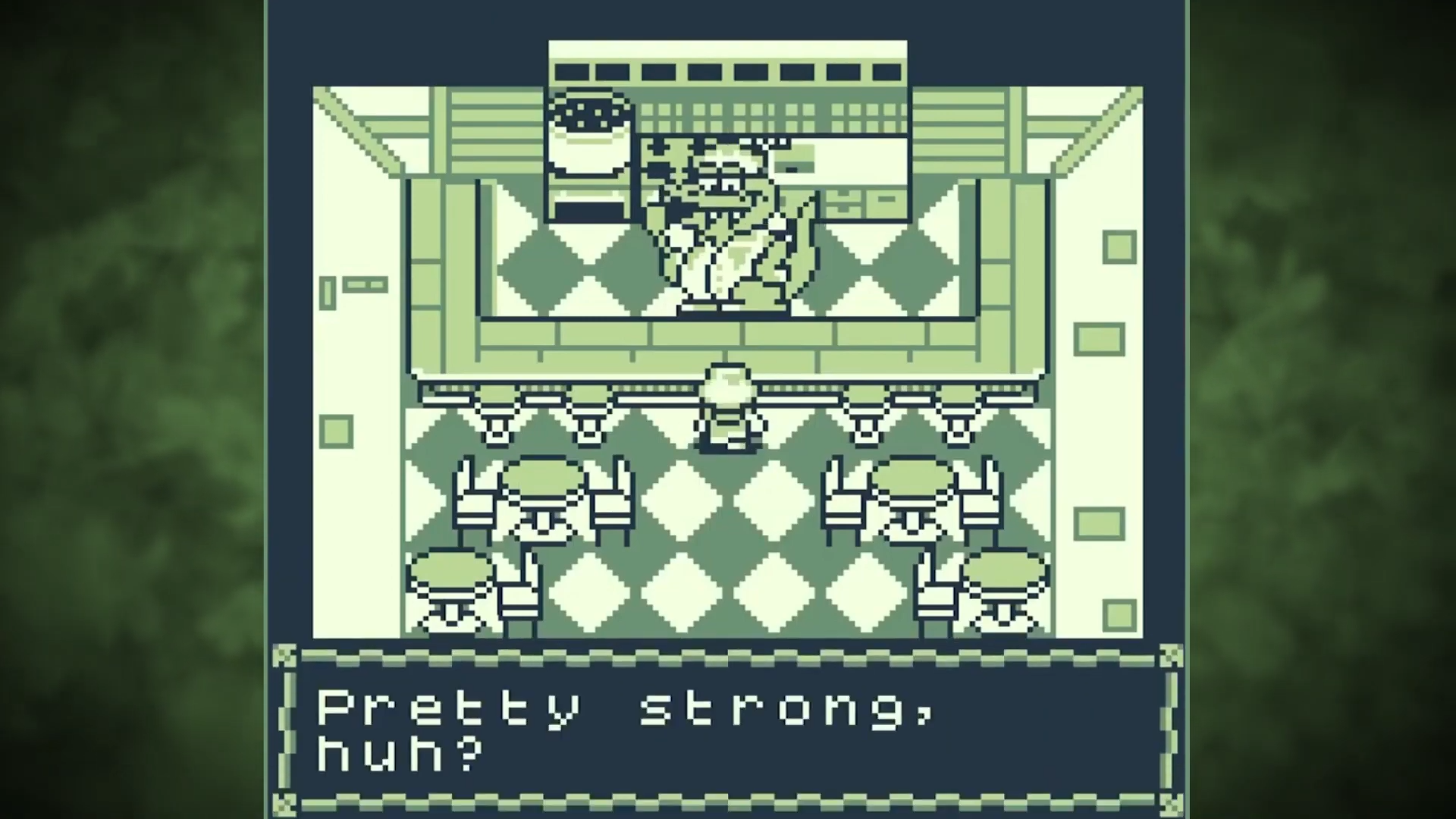
Kudzu
An excellent imitation of some of the crappiest games of yesteryear that I have no interest in revisiting. Sometimes, the objects of our nostalgia should remain in the past.
Platforms: Nintendo Switch, Game Boy (seriously)

Ugh Fine I Guess
This tier includes my (other) least favorite games of the year. These games aren’t necessarily bad (all include some notably positive qualities), but none of them deserve to be honored too far above being “not terrible.”
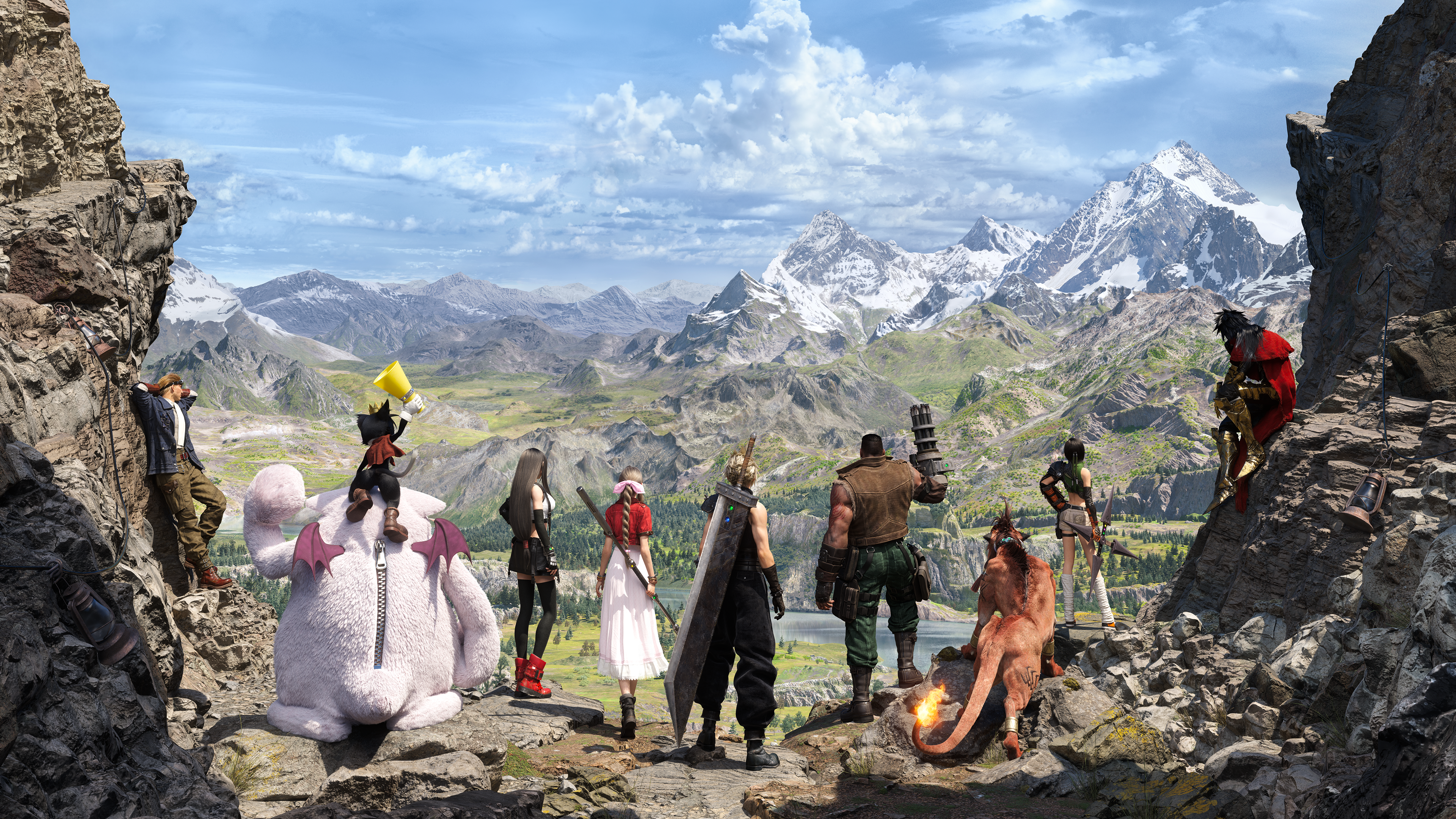
Final Fantasy VII Rebirth
I understand this placement will ruffle some feathers. On its face, Rebirth is a really good action RPG with gorgeous visuals, an exciting combat system, and plenty of content to keep players interested. The problem, unfortunately, is that final qualifier: content. Just about everything in this game feels like bloated content after a certain point. The side quests are fun and engaging until they aren’t. Queen’s Blood is fun and engaging until it isn’t. The story is exhilarating and breathtaking until it isn’t.
About 35 hours in, I reached a breaking point. After hours and hours of trudging through the mud, I just completely lost interest in everything that was happening, all because everything had started to feel like padding. You could tell me the final 15 hours or so I had left in the main story are truly incredible, and I still wouldn’t care. Once I was done, I was done for good.
The more I think about it, my major disappointment with this game has only so much to do with its actual execution. I never played the original Final Fantasy VII, so none of the callbacks or narrative twists really meant anything to me. Even though I liked Remake, that was a much more confined and straightforward experience that anyone could enjoy; Rebirth felt a little more like a treat for longtime fans, and I’m not one of them.
Platforms: PlayStation 5

Literally Pretty Good
Named after NFL analyst Cris Collinsworth’s confusing description of a decent-but-not-excellent football player, this category is for games that are somewhere between slightly above average and flat-out good. Every game on this list is worth a try, but no masterpieces are to be found here.
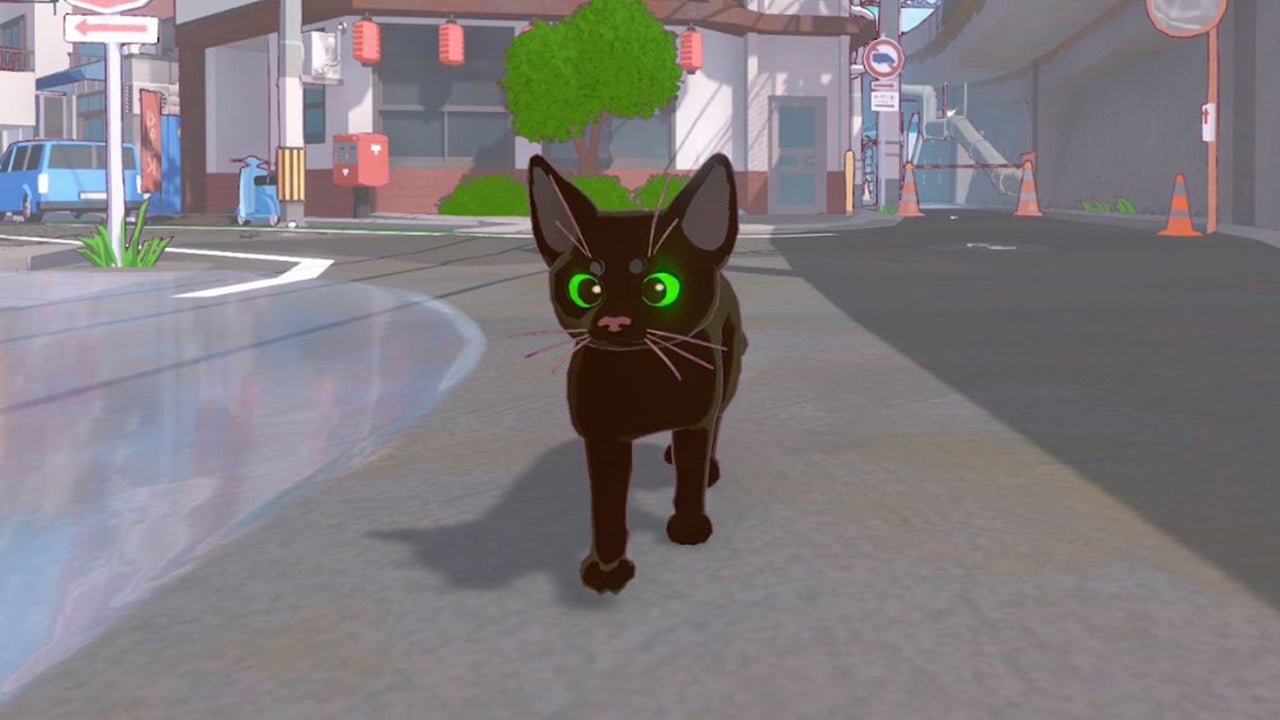
Little Kitty, Big City
While the novelty behind the experience wears off quickly, Little Kitty, Big City is a very pleasant 3D platformer with cute characters and fairly solid world design. Its mechanics and challenges are nothing special, but the game’s general approach to navigating a scary 3D world (at least for a small animal) is worthy of commendation.
Platforms: PC, Xbox One, Xbox Series X/S, Nintendo Switch

Mario vs. Donkey Kong
Probably the most straightforward game I’ve played all year, Mario vs. Donkey Kong—a remake of the Game Boy Advance title of the same name—provides just enough puzzle-platformer goodness to be an easy recommendation for any fans of the genre. Where it falters is a lack of compelling post-game content, somewhat obtuse controls, and its bland visual style. A cromulent game, but not much more than that.
Platforms: Nintendo Switch

Super Monkey Ball: Banana Rumble (Literally Pretty Good GOTY)
Banana Rumble doesn’t really hold a candle to the first two entries in the series, but its actual story challenges are as good as the franchise has offered in over 20 years. The multiplayer modes are largely uninspiring, and the lack of reliable online play is unacceptable in this modern day and age, but if you’re looking for classic Monkey Ball level design, you’ll find plenty of that in Banana Rumble.
Platforms: Nintendo Switch
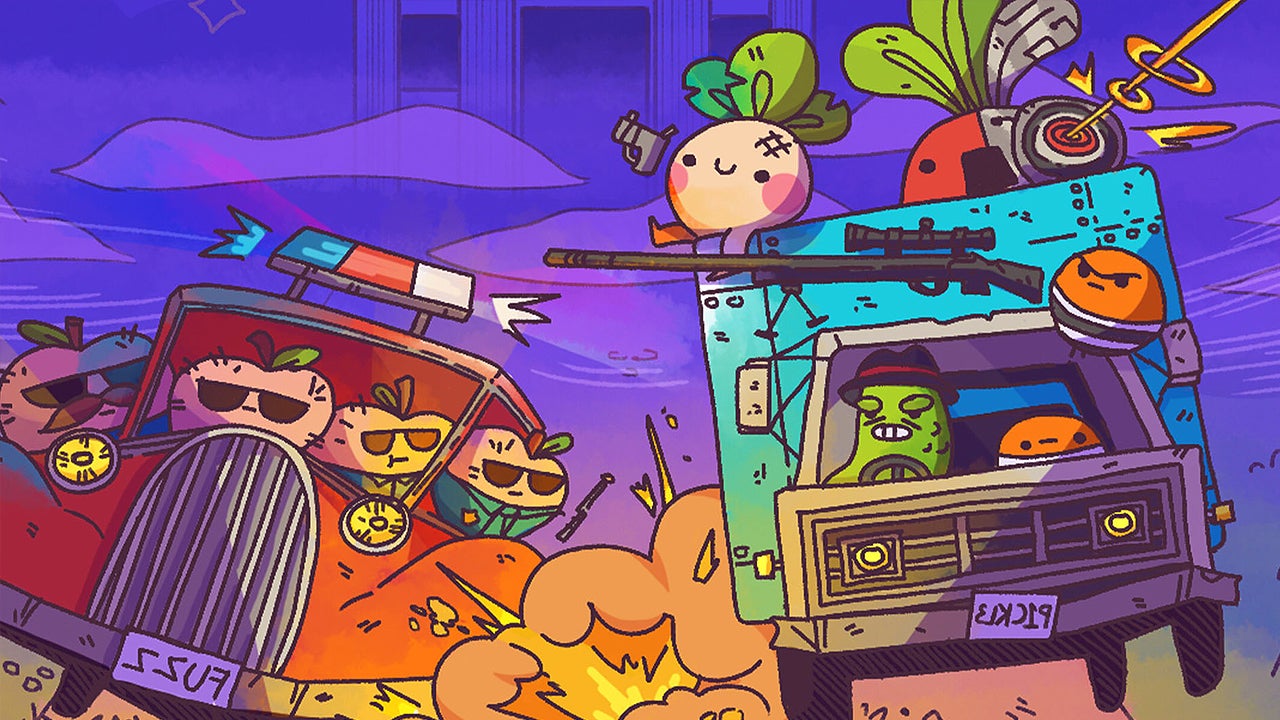
Turnip Boy Robs a Bank
Much like the aforementioned Little Kitty, Big City, Turnip Boy Robs a Bank has a really solid foundation with decent gameplay mechanics, but lacks a lasting punch. I had a great time with Turnip Boy for a handful of bank runs, but after a few hours I felt as though I’d seen and done all I really wanted to. Still, it’s a good time for anyone interested in roguelite twin-stick shooters.
Platforms: PC, Xbox One, Nintendo Switch

Diner Burgers
This tier, formerly known as “Solid As Heck,” includes games that are very good and worth your time and emotional investment, but I would not say are anywhere near being classics. Like this tier’s namesake, the games on this list are like a solid diner burger; not life-changing, but hits the spot.
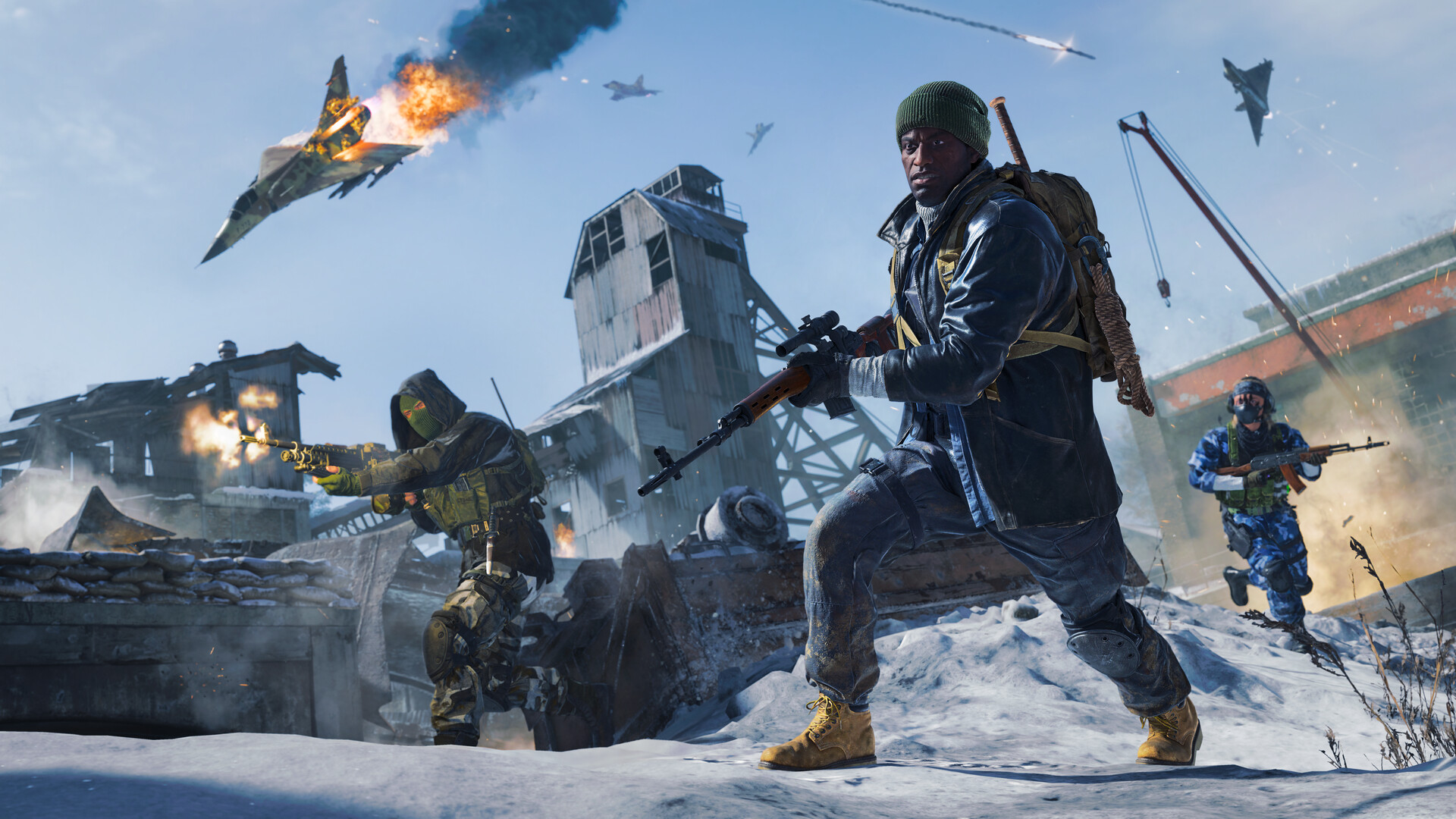
Call of Duty: Black Ops 6
To be honest, I’m as surprised as you are. After writing thousands of words about how Call of Duty had lost its way and completely lacked any sort of personality or aura… I’ve really enjoyed my time with Black Ops 6, in particular its single-player campaign. Instead of just classic run-and-gun sequences in warlike environments (to be clear: There’s still plenty of that), the player also gets to do recon missions during a presidential campaign rally, infiltrate a fancy casino, and even ward off zombies and demons during an especially trippy hallucination sequence. The classic multiplayer modes still deliver exactly what players want, but the better-than-expected single-player content convinced me that COD is (sort of) back.
Platforms: PC, PlayStation 4, PlayStation 5, Xbox One, Xbox Series X/S
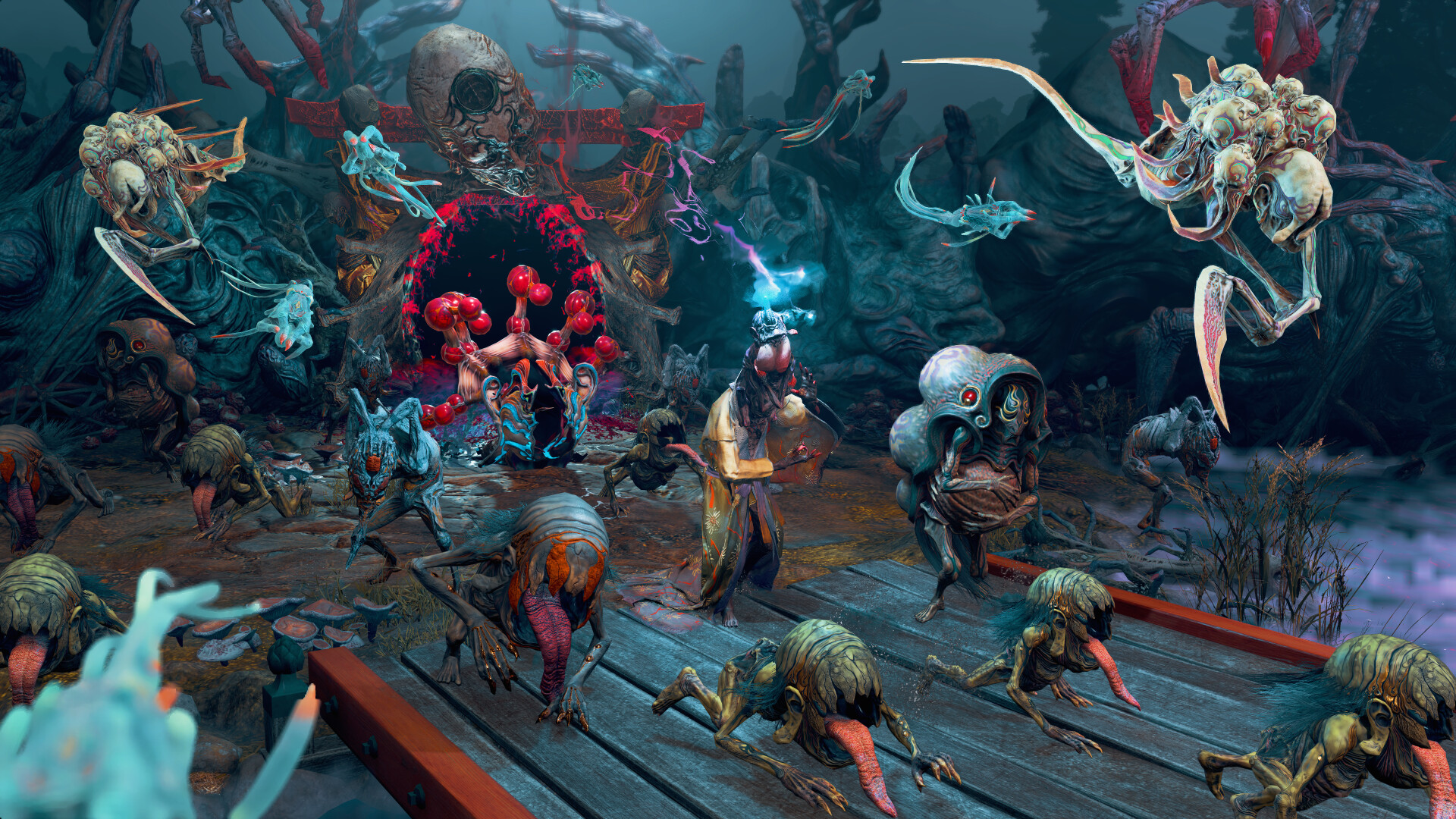
Kunitsu-Gami: Path of the Goddess (Diner Burger GOTY)
Admittedly, I never actually finished Kunitsu-Gami, as some of the later challenges in this hack-and-slash/real-time strategy title tested my patience a little too much. That said, the game is wildly inventive, combining simple katana-based combat with tower defense systems, all with a Japanese folklore-inspired backdrop. Fighting waves of horrifying demons while protecting a goddess is fairly typical video game fare, but Kunitsu-Gami goes a step further, tasking the player with rebuilding fallen villages and restoring harmony to every community the goddess passes through.
While we often see AAA companies like Capcom resting on their laurels, it’s nice to see the major publishers experimenting with new concepts. Kunitsu-Gami is a great example of clever ideation mixed with solid execution.
Platforms: PC, PS4, PS5, Xbox One, Xbox Series X/S

Penny’s Big Breakaway
I was pretty high on Penny’s Big Breakaway to start the year. For the most part, the debut title from Evening Star delivered on what I wanted: a Sonic Adventure-inspired 3D platformer with a gorgeous pastel color palette and super fun momentum-based movement mechanics. While I had a great time with it, once I was done, I was done. The optional post-game levels didn’t compel me enough to keep playing, and the half-baked approach to in-stage collectibles made level replays kind of pointless. Still, Penny’s Big Breakaway is a really solid platformer that any lover of late ’90s gaming will appreciate.
Platforms: PC, PS5, Xbox Series X/S, Switch

Super Rad!
Now we’re talking! All of these games are really, really good, and I would recommend them to just about anyone. Maybe none of them are quite GOTY material, but they’re all pretty damn great.
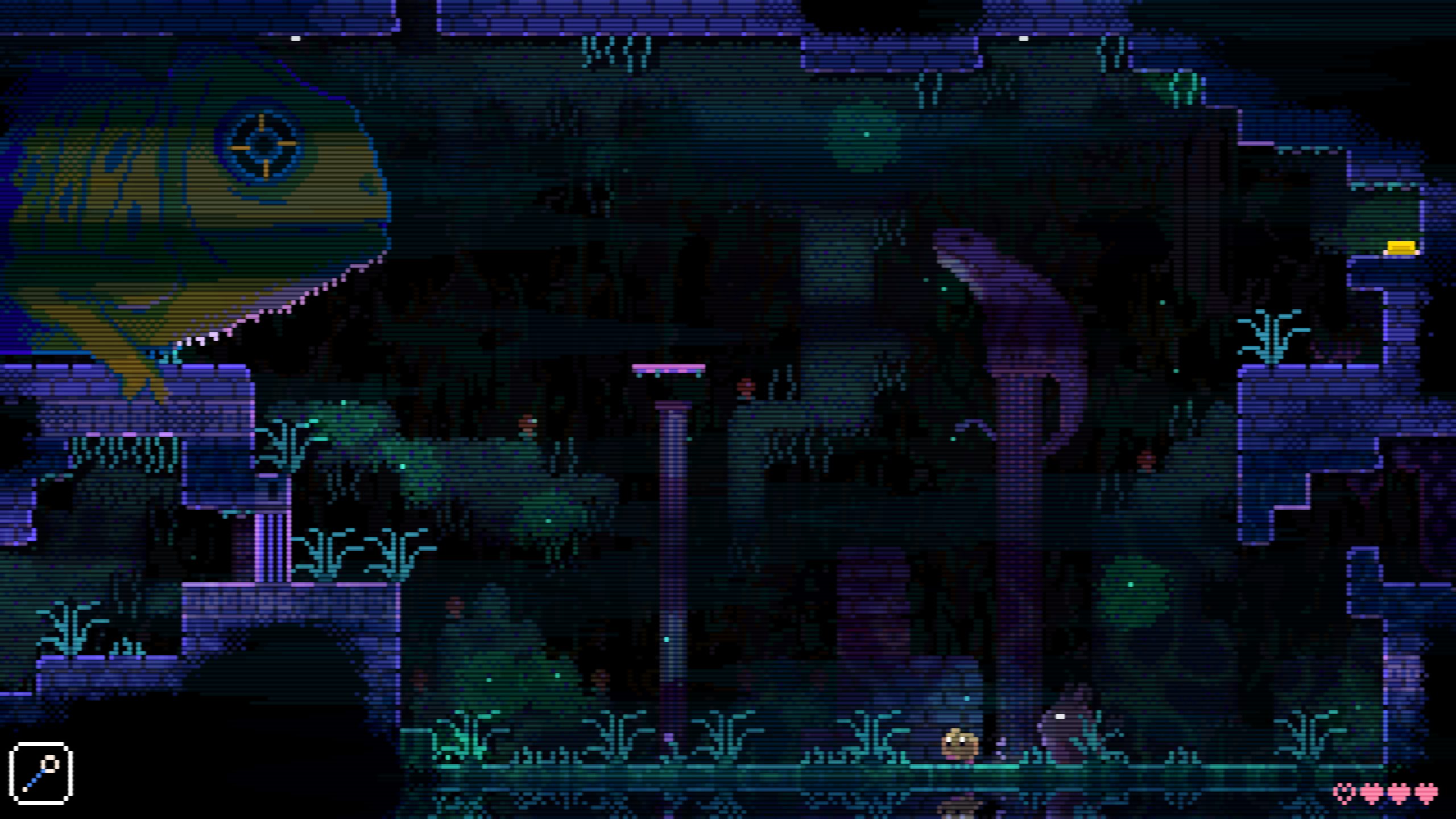
Animal Well (Super Rad GOTY)
Animal Well‘s greatest moments truly shine because they can only really exist in a video game. There’s no explanation or major lore dumps; just incredible moments of exploration and discovery at every turn. With some of the best pixel art of any indie title in years and some of the wildest “aha!” moments of any game in recent memory, Animal Well really is a paragon of what makes the medium truly special.
Unfortunately, those amazing moments of discovery eventually appear fewer and farther between, resulting in diminishing returns and a frustrating overreliance on backtracking. Had the latter hours been executed better, this game would have ranked higher.
Platforms: PC, PS5, Xbox Series X/S, Switch
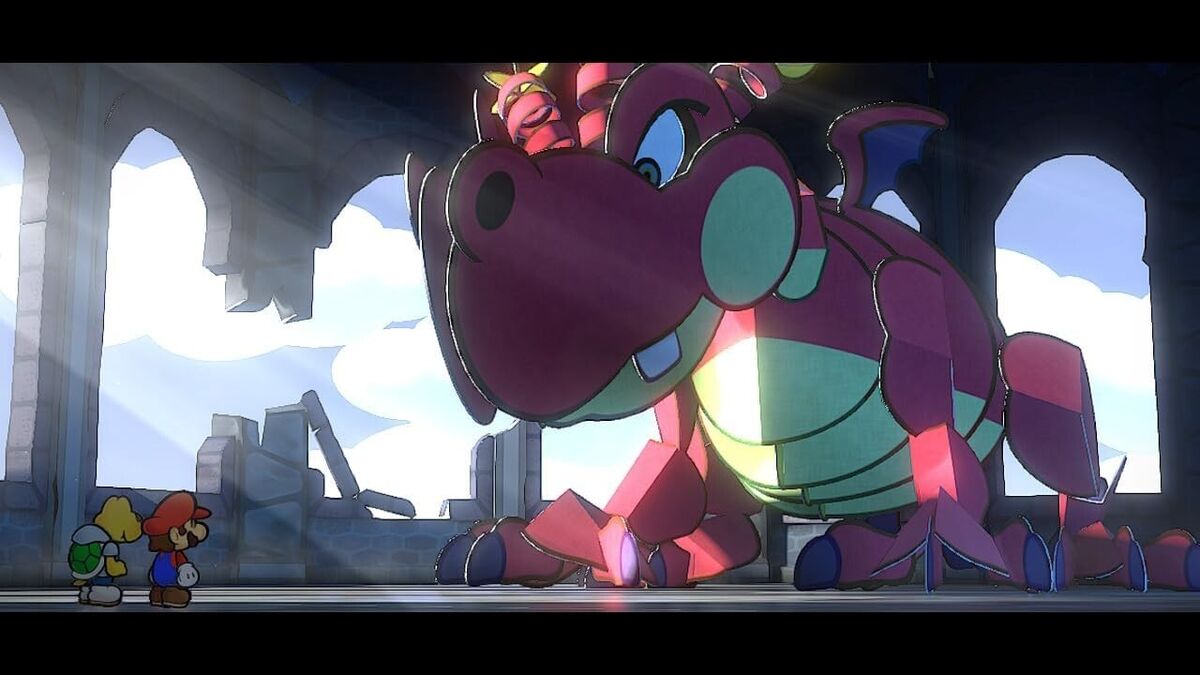
Paper Mario: The Thousand-Year Door
As far as remakes go, The Thousand-Year Door isn’t especially ambitious. There are clear visual upgrades, an updated soundtrack, and a few quality-of-life improvements, but for the most part you’re playing the same game you did 20 years ago.
That said, that game from 20 years ago is pretty damn good! The Thousand-Year Door is chock full of lovable companions, exciting combat moments, fun level design, and truly phenomenal writing. Mario RPGs tend to be fairly hit-or-miss, but this one is a bullseye.
Platforms: Switch
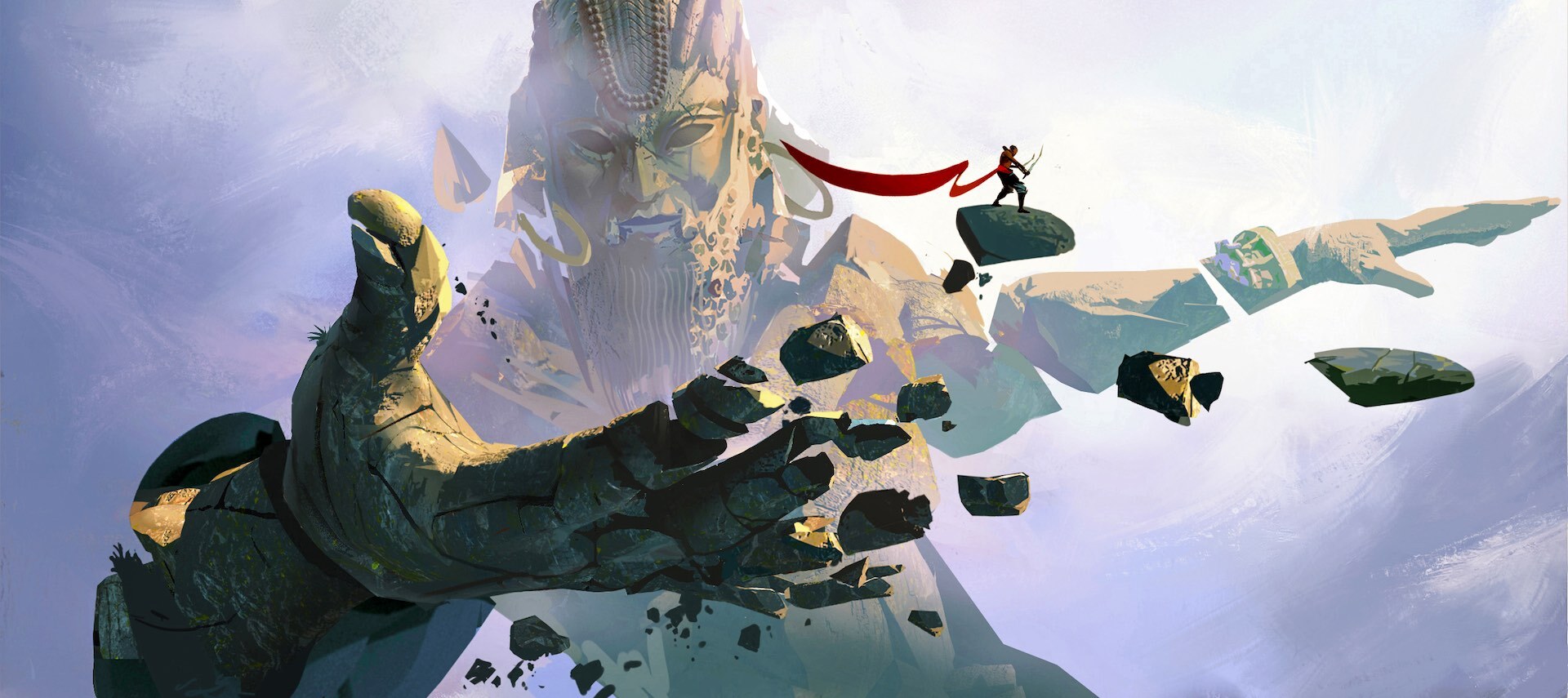
Prince of Persia: The Lost Crown
Despite my contrived rivalry with David Silbert over recent Metroidvania games, I really, truly enjoyed my playthrough of The Lost Crown. Its narrative components are nothing to write home about, but it really nails the feelings of wonder and excitement one might find while lost in a hostile, labyrinthine world. Its combat mechanics are particularly stellar, with some boss fights matching the intensity and difficulty of those in Hollow Knight.
So, why isn’t this game in a higher tier? While this response may come off as absurd to some, it’s fairly simple: Once I finished the game’s main story, I felt very little reason to return. A lot of the optional challenges failed to draw me in, and I have surprisingly little interest in playing any of the game’s DLC. For whatever reason, The Lost Crown—as sharply designed and impeccably executed as it is—hardly made a lasting impact on me, and I can’t deny the importance of that. Still, it’s a really good game I’d recommend to just about anyone who enjoys 2D world design.
Platforms: PC, macOS, PS4, PS5, Xbox One, Xbox Series X/S, Switch

Hall of Curtis Granderson
This tier is named after former MLB star Curtis Granderson, who had about as good a career a baseball player could have without any real chance of making the Hall of Fame. All of these games are awesome, but just miss being in the GOTY discussion.
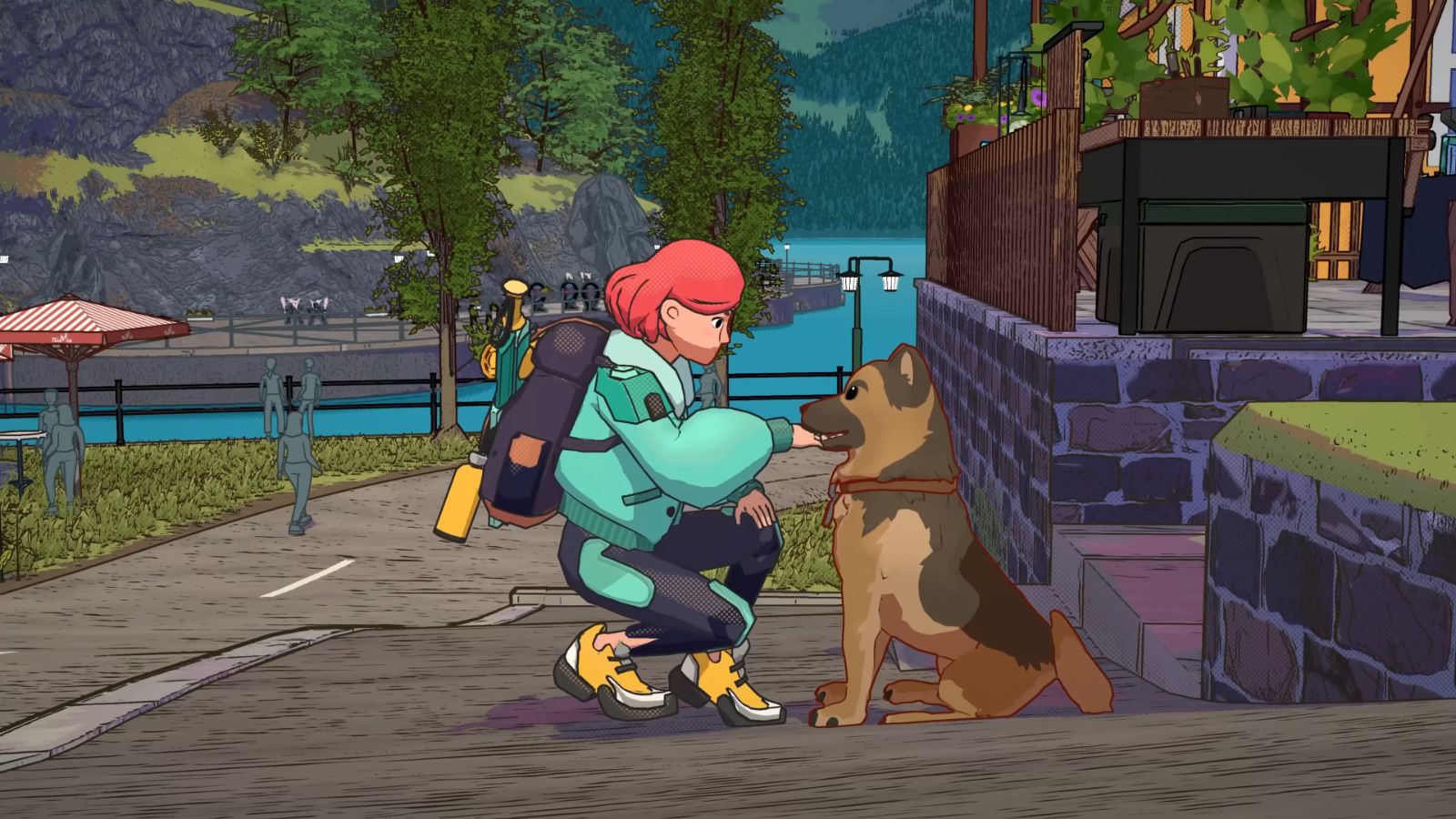
Dungeons of Hinterberg
A clever mix of Zelda-like dungeon design and Persona-like relationship-building systems, Dungeons of Hinterberg not only offers a solid swirl of action-based and cozy gameplay; it truly excels at both. A thoughtful meditation on the purpose of vacation and the potential pitfalls surrounding travel hotspots, the game’s story, world, and characters truly resonated with me, and the actual exploration and puzzle-solving kept me hooked from beginning to end. (The combat, while mostly fine and largely functional, left a little to be desired.)
Typically, I have a complicated relationship with Zelda-likes. They either focus way too much on the vibes and offer substandard gameplay and dungeon design or nail the gameplay side and feel otherwise flat. Dungeons of Hinterberg, however, manages to learn the right lessons from its biggest inspirations; you need to keep the player guessing, make each dungeon feel unique, and present a world so enchanting and tantalizing that the player enjoys just existing in it.
While the game didn’t manage to find a particularly large audience this year (despite its availability on Game Pass), I hope people who love the gameplay and vibes of Zelda but want more cozy elements will eventually give Dungeons of Hinterberg a chance. While not the best indie of the year in my book, it certainly has been the most overlooked.
Platforms: PC, Xbox Series X/S

The Legend of Zelda: Echoes of Wisdom (Hall of Curtis Granderson GOTY)
It should come as no surprise to anyone familiar with my work (and my tastes) that I’d rank any new Legend of Zelda game fairly high on my end-of-year list. To be honest, Echoes of Wisdom doesn’t even rank in my top 10 Zelda games ever made, and it’s not even one of the better ones released for the Switch. That said, it truly is a great experience that contains just enough of that classic Zelda goodness I eternally crave while radically altering the minute-to-minute gameplay in delightful ways.
Obviously, the chance to play as the titular princess herself is one I’ve wanted to take for decades, but the way developer Grezzo reimagined tried-and-true Zelda mechanics and systems to allow for dozens of potential play styles and strategies makes Echoes of Wisdom a must-play for any fan of the series and its characters. It certainly has its slower moments, and combat encounters can be clunky at times, but Echoes of Wisdom is a treat for anyone who has loved the series as long as I have, and I’m amazed at how Nintendo can simultaneously be so risk-averse and wildly creative with its biggest IP.
Platforms: Switch
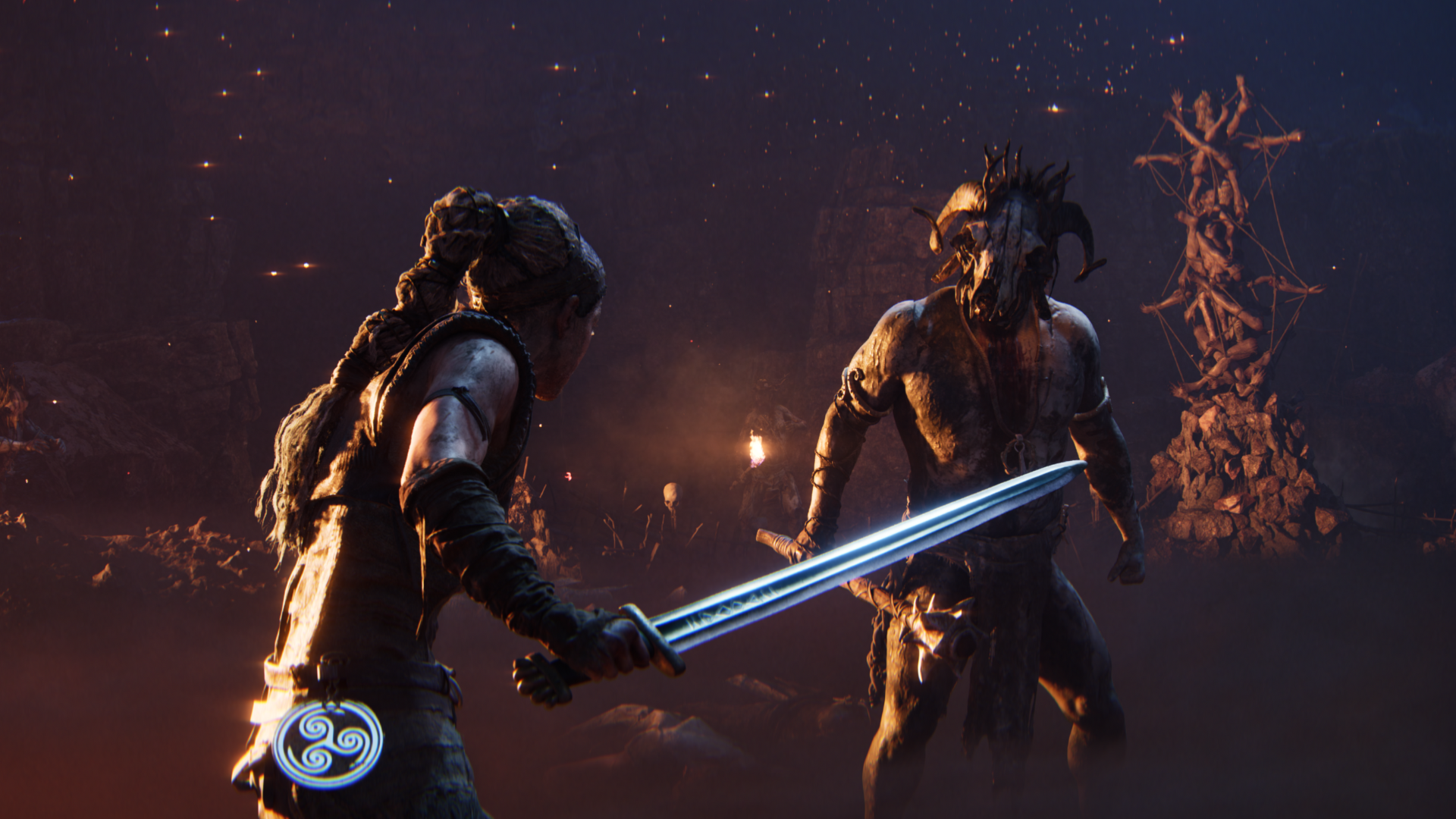
Senua’s Saga: Hellblade II
There’s a lot to dislike about Hellblade II. The plot’s not quite as sharply written as that of its predecessor. The combat, while much improved, remains fairly simplistic and shallow. More than a third of the game is basically a glorified walking simulator.
That said, I loved playing through this game. Gamers and critics alike tend to throw around the word “immersion” a little too much for my taste, but Hellblade II really felt like an immersive experience, particularly with its gorgeous visual fidelity and impeccably sharp audio design. Senua trudges through dangerous scenarios and locales with evil voices haunting her at every turn, and I felt every single part of it.
Beyond that, the actual level and puzzle design really shine, with some of the year’s best cinematic gameplay set-pieces and a handful of visual cues that continue to stick with me months later. It’s not a perfect sequel or an all-time great, but when Hellblade II sings, it sings.
Standings: PC, Xbox Series X/S

Could Be GOTY in Any Year
The cream of the crop. While none of these games are my *actual* GOTY of 2023, each is phenomenal and could have easily been the winner in a different year.
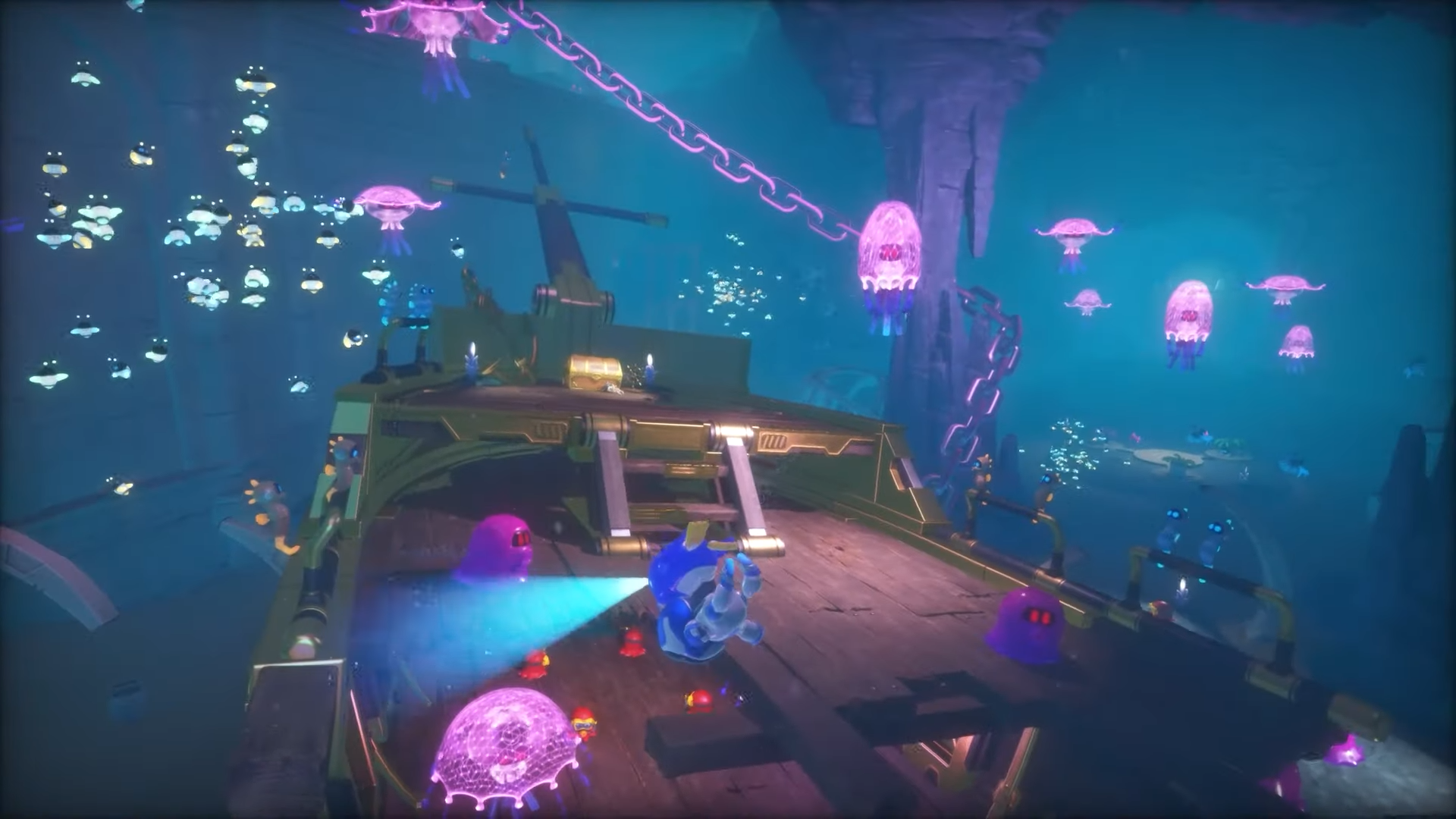
Astro Bot
It can be difficult to describe just how good a mascot-based 3D platformer is, since its best qualities can often only truly be felt with your hands on the sticks. Astro Bot, much like its predecessor Astro’s Playroom, is a remarkably tactile experience, fully utilizing the full suite of capabilities found in the PlayStation 5’s Dualsense controller and masterfully crafting worlds where such tactility makes itself known at every turn. Still, just talking about it isn’t enough.
I can tell you about how colorful and vibrant each level is. I can tell you how exciting it is to unlock new bots representing characters from classic PlayStation games across decades. I can tell you about how the platforming mechanics perfectly balance weight and speed. But you can only really know for sure just how amazing Astro Bot is by playing it. That, more than anything, makes it an excellent video game, and one I hope developers continue to learn from going forward.
Platforms: PS5

Balatro
Balatro isn’t just a super-addictive roguelite deckbuilder: It’s a powerful vortex of delight, shame, temptation, and adrenaline all at once. Every single time I’ve thought to myself, “I’m done with this game, I’ve seen enough,” it always pulls me back, and I’m always happy to be back. Who knew that a standard deck of playing cards still held space for new gaming innovations?
Platforms: PC, macOS, PS4, PS5, Xbox One, Xbox Series X/S, Switch, iOS, Android

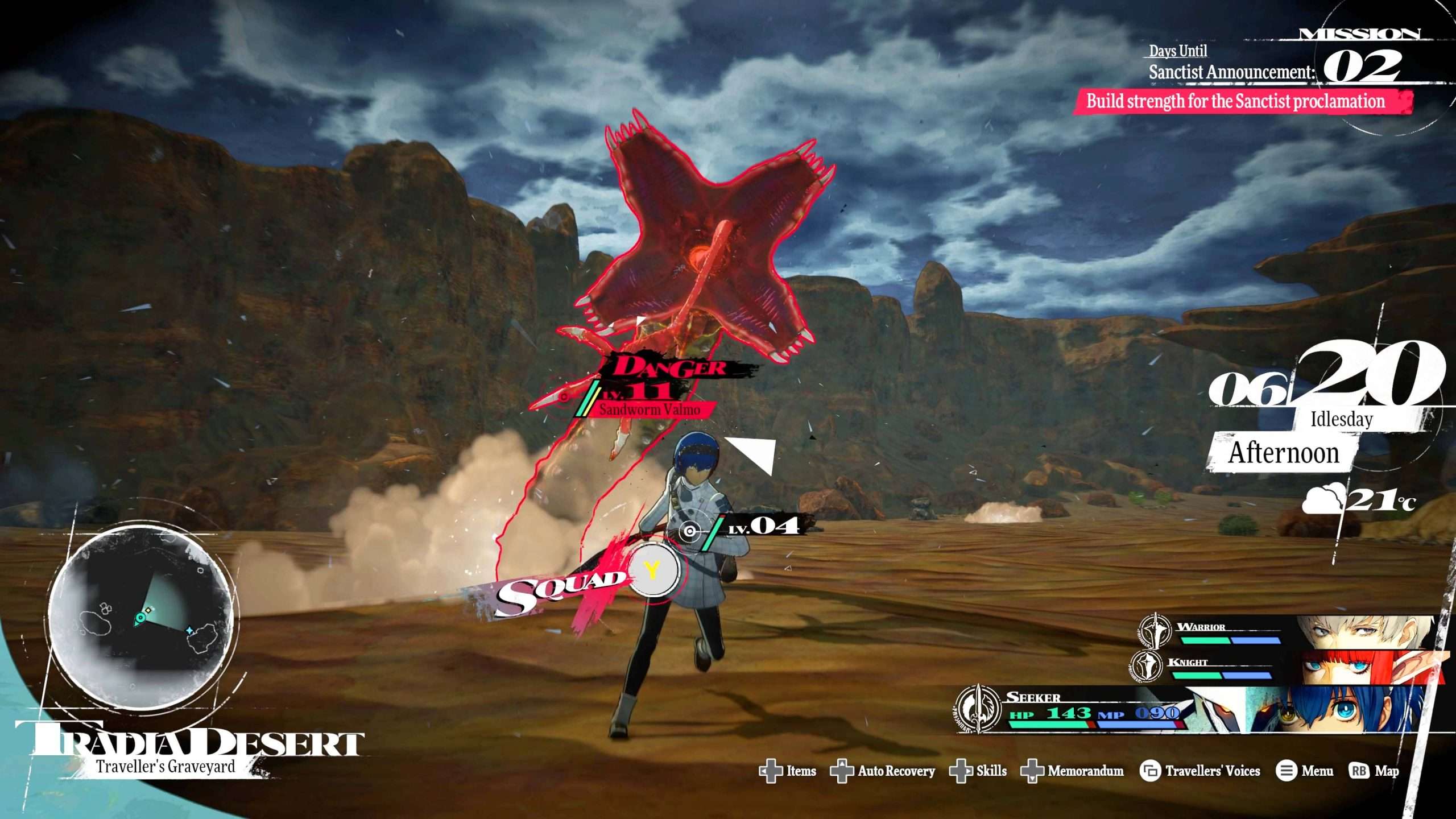
Game of the Year: Metaphor: ReFantazio
To be honest, it feels a little weird picking this game as my Game of the Year, especially since I haven’t actually finished it. Sure, it’s an impeccably well-designed turn-based RPG with a phenomenally balanced and unique combat system, top-notch writing and voice acting, gorgeous character designs, and an ever-charming sense of style in its UI. Sure, its bond system (taken straight from Persona) allows for a lot of heartwarming (and heartbreaking) character interactions, and its approach to the passage of in-game time makes every single possible action worthwhile. But we get great RPGs every year (some might even argue this wasn’t even the best Atlus RPG of 2024). So what exactly elevates Metaphor: ReFantazio to the top of the mountain? The answer is simple: its integration of complex RPG mechanics into a fascinating and ever-evolving story.
If you are at all familiar with Metaphor’s core narrative, you’d know that its story is what really drew people in and what kept them playing for dozens of hours. Obviously, Metaphor’s depiction of what is effectively an election cycle—particularly in a setting defined by racial stratification and overt fascism basically everywhere—certainly resonates given the year we’ve all experienced politically. Just as important to me, though, is not just how Metaphor’s characters passionately respond to the tumultuous era they live in, but how much they allow their preconceived notions to be challenged by new information and new developments.
In particular, the game masterfully incorporates RPG mechanics into how much each playable character learns from their experiences. Every character begins with a unique Archetype—a magical spirit that serves as the source of the character’s “job”—but has to learn and master other Archetypes to progress. In addition, each bonding moment comes with its own tangible rewards, so chatting with your pals isn’t just to get more acquainted: It’s essential to progress through the game. It’s not just the cutscenes and bonding moments that offer opportunities for people to expand their understanding of sociopolitical matters; the actual gameplay is instructive of that growth as well.
The story of Metaphor: ReFantazio has its twists and turns, and it covers a broad range of thorny topics: equality vs. equity, christofascism, populism, authoritarianism, race essentialism, the inherent vulnerability of the poor, contact-resistant communities, and much, much more. What really stuck with me, though, was not just the courage and conviction of your squad, but how they’re constantly learning and challenging themselves as well. As we navigate continued political uncertainty in this country, it’s important for us to remember that we can always learn more about each other, and that the bonds we create are ultimately what define us. Metaphor understands that, and that is why it’s my Game of the Year for 2024.
Platforms: PC, Xbox Series X/S, PS4, PS5
What Are Your Favorite Games of 2024?
Let me know in the comments!
Sam has been playing video games since his earliest years and has been writing about them since 2016. He’s a big fan of Nintendo games and complaining about The Last of Us Part II. You either agree wholeheartedly with his opinions or despise them. There is no in between.
A lifelong New Yorker, Sam views gaming as far more than a silly little pastime, and hopes though critical analysis and in-depth reviews to better understand the medium's artistic merit.
Twitter: @sam_martinelli.


